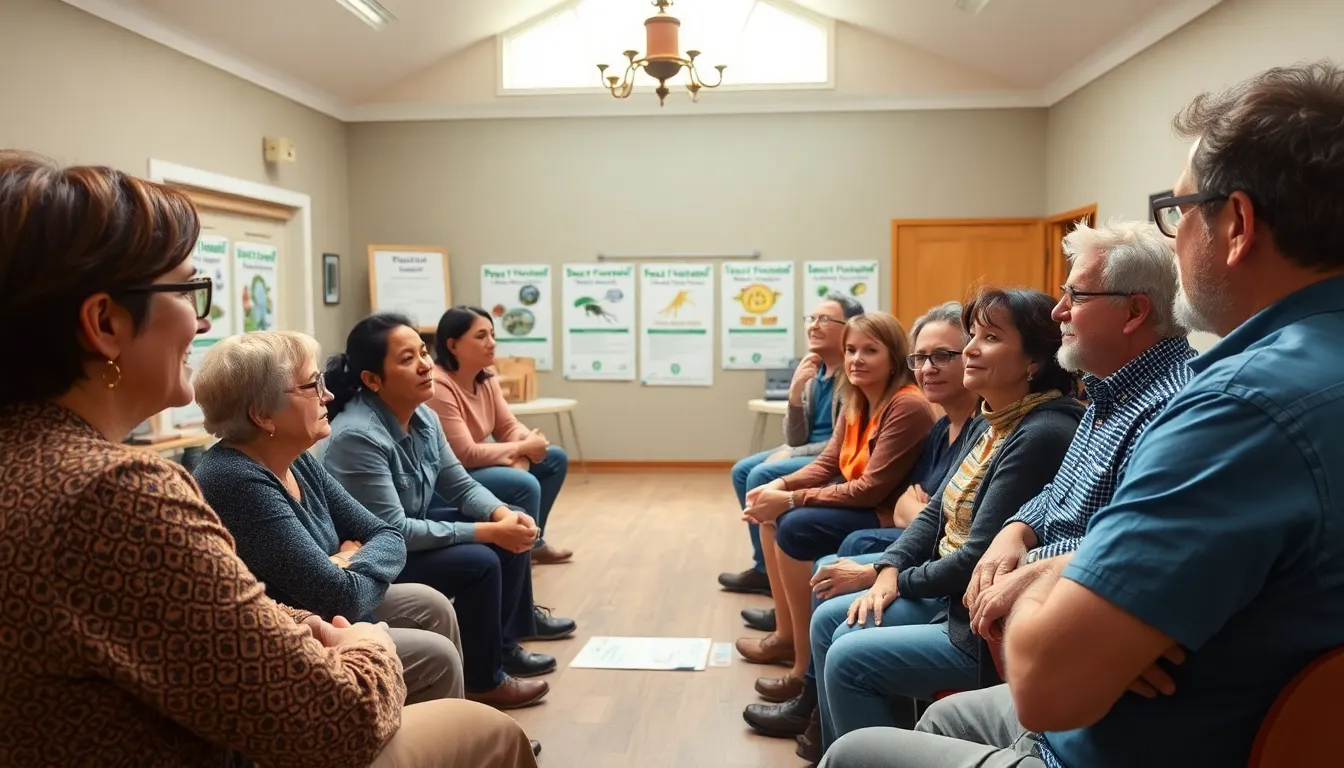In a world where pests seem to have a knack for crashing the party, Pest Education Services swoops in like a superhero with a spray can. From pesky ants to uninvited rodents, these services aren’t just about extermination; they’re about empowerment. They teach homeowners how to outsmart their unwanted guests, turning the tables on those little critters that think they can take over.
Table of Contents
ToggleOverview of Pest Education Services
Pest Education Services empower homeowners to address pest issues with knowledge and practical solutions. The organization provides training on pest identification, prevention techniques, and management strategies. Homeowners learn to recognize signs of infestation and understand pest behavior, making it easier to implement effective control measures.
Workshops and seminars cover various topics, including the biology of common pests like ants and rodents. These sessions focus on sustainable practices that minimize chemical use, promoting healthier living environments. In addition, resources such as pamphlets and online materials offer ongoing support for homeowners seeking information.
Advisors specialize in tailoring advice to fit specific issues faced by homeowners. By assessing individual situations, they guide users in selecting the right management strategies. Community outreach programs enhance awareness about local pest challenges, fostering a proactive approach among residents.
Pest Education Services also emphasize collaboration. Homeowners are encouraged to connect with neighbors, forming support networks to share experiences and solutions. Engaging with pest control professionals becomes a vital part of their resource toolkit, ensuring effective management strategies remain at users’ fingertips.
The ultimate goal focuses on fostering independence among homeowners. Education equips them with the skills needed to mitigate pest problems effectively, leading to healthier homes and reduced reliance on extermination services. By prioritizing long-term management and ecological balance, Pest Education Services play a crucial role in encouraging responsible pest control practices.
Importance of Pest Education

Pest education plays a critical role in empowering homeowners to manage pest issues effectively. Understanding pest behaviors and prevention techniques leads to healthier living environments.
Benefits for Homeowners
Homeowners gain several advantages through pest education. Knowledge of pest identification helps individuals recognize infestations early. Learning prevention strategies reduces the risk of future problems. Workshops enhance awareness of sustainable practices, minimizing chemical use in homes. Access to resources like pamphlets and online materials offers ongoing support. Enhanced communication with neighbors fosters a community approach to pest management. Ultimately, educated homeowners experience increased confidence in handling pest issues independently, resulting in healthier homes and reduced dependency on extermination services.
Benefits for Professionals
Professionals also see significant benefits from pest education initiatives. Training programs equip pest control experts with updated knowledge on pest biology and management strategies. Improved communication skills allow them to better inform and guide homeowners. Collaborative outreach programs strengthen ties between experts and communities. Sharing insights builds trust with residents, leading to higher customer satisfaction. Ultimately, well-educated professionals contribute to more effective pest control solutions, driving sustainable practices within the industry.
Types of Pest Education Services
Pest Education Services offers various types of training to enhance homeowners’ skills in managing pest-related issues effectively. These services empower individuals to adopt sustainable practices for healthier homes.
Workshops and Training
Hands-on workshops provide essential training on pest identification and management techniques. Participants learn to recognize the signs of infestations in real-time, such as droppings and nesting behaviors. By engaging in interactive sessions, attendees gain skills that ensure effective preventative measures. Workshops emphasize sustainable approaches, reducing reliance on chemicals. Training sessions often feature experts sharing insights on pest biology and behaviors, enhancing understanding of common pests. These experiences foster confidence, enabling homeowners to tackle issues independently.
Online Courses
Flexible online courses offer accessible learning opportunities for busy homeowners. Individuals can study at their own pace, with materials covering various aspects of pest management. Topics include the biology of common pests, identification strategies, and preventive measures. Interactive quizzes help reinforce knowledge and retention. Supplemental resources, such as videos and downloadable guides, enhance learning experiences. These courses not only educate but also promote communities working collaboratively to solve pest problems. Homeowners gain practical skills to manage infestations effectively, contributing to healthier living environments.
Key Providers of Pest Education Services
Pest education services are offered through a mix of public and private institutions, each playing a crucial role in educating communities.
Public vs. Private Institutions
Public institutions, including universities and extension services, typically provide free or low-cost educational resources. These resources may consist of workshops, seminars, and online courses designed to educate the community on pest management and prevention. Private institutions, on the other hand, often charge for pest education programs but may offer specialized training tailored for specific audiences. Such institutions might partner with pest control companies, expanding their outreach and resources. Both institutions prioritize a community-focused approach to pest education, ensuring homeowners gain the skills needed to recognize and manage pest issues effectively.
Community-Based Programs
Community-based programs enhance the reach and impact of pest education services. Local workshops may offer hands-on training opportunities, engaging residents directly in learning about pest identification and sustainable management techniques. Collaborations with neighborhood associations promote shared responsibility for pest control, enabling residents to work together toward common goals. These programs often utilize pamphlets and online materials for continuous education, making information easily accessible. Comprehensive initiatives ensure that communities become well-informed, fostering a collaborative spirit in addressing pest challenges while promoting healthier living environments.
Challenges in Pest Education
Pest education faces several challenges impacting its effectiveness. Limited awareness about available resources often hinders homeowners from seeking necessary guidance. Many individuals remain unaware of the importance of proactive pest management.
Another challenge stems from varying levels of engagement among different communities. Some areas benefit from strong participation, while others exhibit indifference towards pest education initiatives. This discrepancy creates gaps in knowledge and support, preventing effective community-driven pest management.
Financial constraints also limit access to pest education programs. High costs associated with specialized training deter some homeowners from participating. Public institutions providing free or low-cost resources often struggle with funding, affecting their ability to reach wider audiences.
Additionally, evolving pest behavior complicates educational efforts. With changing climates impacting pest populations, education must adapt swiftly. Homeowners may not recognize new threats, making timely information crucial for effective management.
Communication barriers can further hinder the goal of comprehensive pest education. Language differences pose challenges, especially in diverse communities where non-English speakers require translated materials. Addressing these barriers is essential to ensure all residents access critical information.
Finally, misinformation about pest management strategies remains pervasive. Misleading advice can result in ineffective practices, leading to frustration and increased infestations. Clear, accurate educational content is vital to combat myths and promote sustainable approaches.
While challenges exist, addressing these obstacles enhances the effectiveness of pest education services. Collaborative efforts among community organizations and pest control professionals foster a more informed public, ultimately leading to healthier living environments.
Future Trends in Pest Education Services
Emerging technologies significantly influence pest education services. Digital learning platforms provide flexible options, allowing homeowners to access training anytime. Virtual seminars and webinars expand outreach, making it easier for communities to participate in educational initiatives.
Increased focus on sustainability drives curriculum development. Courses now emphasize integrated pest management strategies, reducing reliance on chemical solutions. Embracing environmentally friendly practices not only protects health but also promotes ecosystem balance.
Collaboration between pest control companies and educational institutions enhances program effectiveness. These partnerships foster real-world applications of learned skills, bridging gaps between theory and practice. Engaging local experts as trainers enriches the learning experience.
Data-driven approaches shape the future of pest education. Analyses of pest behavior become integral to training, equipping homeowners with actionable insights. Access to real-time data enables timely interventions, minimizing infestations and associated damage.
Multilingual resources gain importance due to diverse communities. Offering materials in various languages ensures broader access to critical information. Culturally relevant training methods also improve understanding and effectiveness.
Moreover, community-based learning initiatives continue to evolve. Workshops focus on local pest issues, addressing specific regional challenges. Engaging neighborhoods fosters a sense of shared responsibility in pest management.
Incorporating gamification enhances learning experiences. Interactive elements motivate participation and retention of information. Participants respond positively to new methods, making training sessions more enjoyable and effective.
Ultimately, Pest Education Services adapt to meet emerging trends and community needs. These initiatives aim to create well-informed homeowners who take proactive measures against pests. Strengthening community ties ensures lasting impact and healthier living environments.
Pest Education Services plays a vital role in empowering homeowners to tackle pest issues effectively. By providing essential training and resources, it fosters a proactive approach to pest management that prioritizes sustainability and community collaboration.
As awareness of pest behavior and prevention strategies grows, homeowners can create healthier living environments while enhancing their confidence in handling infestations. The ongoing evolution of educational initiatives ensures that both homeowners and pest control professionals remain equipped with the latest knowledge and skills.
Ultimately, investing in pest education not only addresses immediate concerns but also promotes long-term solutions that benefit entire communities.


